Related Research Articles

The Football Association or the FA is the governing body of association football in England and the Crown Dependencies of Jersey, Guernsey and the Isle of Man. Formed in 1863, it is the oldest football association in the world and is responsible for overseeing all aspects of the amateur and professional game in its territory.
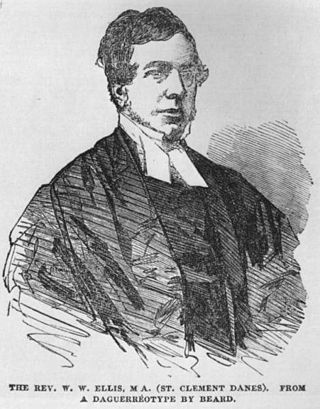
William Webb Ellis was an English Anglican clergyman who, by tradition, has been credited as the inventor of rugby football while a pupil at Rugby School. According to legend, Webb Ellis picked up the ball and ran with it during a school football match in 1823, thus creating the "rugby" style of play. Although the story has become firmly entrenched in the sport's folklore, it is not supported by first hand evidence, and is discounted by most rugby historians as an origin myth.
1839 in sports describes the year's events in world sport.
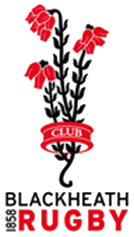
Blackheath Football Club is a rugby union club based in Well Hall, Eltham, in south-east London.

The Queen's Club is a private sporting club in Barons Court, West Kensington, London, England. The club hosts the annual Queen's Club Championships men's grass court lawn tennis tournament. It has 28 outdoor courts and ten indoor. With two courts, it is also the national headquarters of real tennis, hosting the British Open every year excepting 2020 due to the coronavirus pandemic. The Queen's Club also has rackets and squash courts; it became the headquarters for both sports after the closure of the Prince's Club in 1940.

Ebenezer Cobb Morley was an English sportsman. He is regarded as one of the fathers of the Football Association (FA) and modern football.
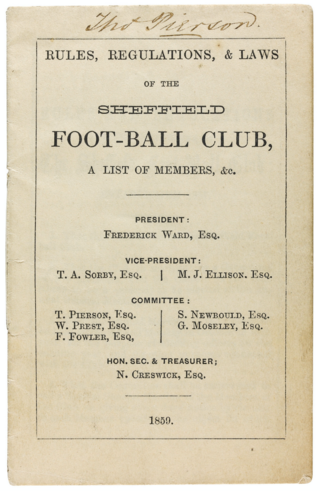
The Sheffield Rules was a code of football devised and played in the English city of Sheffield between 1858 and 1877. The rules were initially created and revised by Sheffield Football Club, with responsibility for the laws passing to the Sheffield Football Association upon that body's creation in 1867. The rules spread beyond the city boundaries to other clubs and associations in the north and midlands of England, making them one of the most popular forms of football during the 1860s and 1870s.
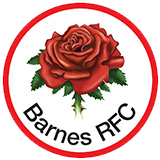
Barnes Rugby Football Club is a rugby union club based in Barnes, London. The club currently play in the fourth tier of the English league system, National League 2 East, following an increase of fourth tier leagues from two to three.
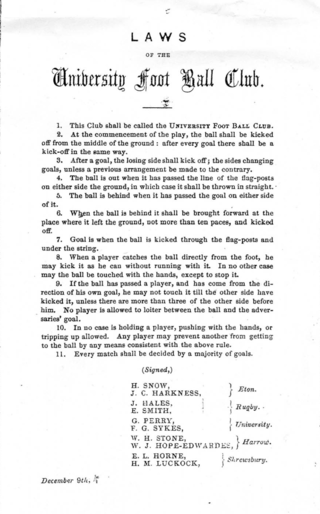
The Cambridge Rules were several formulations of the rules of football made at the University of Cambridge during the nineteenth century.

The oldest football clubs trace their origins to the mid-19th century, a period when football evolved from being a casual pastime to an organised mainstream sport.
The following are events in the 1840s decade which are relevant to the development of association football. All events happened in English football unless specified otherwise.
The following are events in the 1860s decade which are relevant to the development of association football. Included are events in closely related codes, such as the Sheffield Rules. All events happened in English football unless specified otherwise.

The 1873 FA Cup final was an association football match between Wanderers F.C. and Oxford University A.F.C. on 29 March 1873 at the Lillie Bridge Grounds in London. It was the second final of the world's oldest football competition, the Football Association Challenge Cup. Unusually, the final kicked-off in the morning to avoid a clash with the annual Oxford-Cambridge Boat Race which was held on the same day. The Wanderers reached the final without playing a match, as the original rules of the competition stated that the holders would receive a bye straight to the final and other teams would compete to gain the other place in the final and challenge them for the trophy. Oxford reached the final when their semi-final opponents, the Scottish club Queen's Park, withdrew from the competition.

Cambridge University Association Football Club is an English football club representing the University of Cambridge. It is affiliated to the Football Association as the Cambridge University FA, and has representation on the FA Council equivalent to a County Football Association.
During the early modern era, pupils, former pupils and teachers at English public schools developed the rules of football, eventually leading to the first written codes of football most notably the Eton College (1815) and Aldenham school (1825) football rules, and rugby football (1845). British public schools football also directly influenced the rules of association football.
The sport of association football has a long history in England.
Crystal Palace F.C. was a short-lived amateur football club formed in 1861, who contributed to the development of association football during its formative years. They were founder members of the Football Association in 1863, and competed in the first ever FA Cup competition in 1871–72.

Football is a family of team sports that involve, to varying degrees, kicking a ball to score a goal. Unqualified, the word football generally means the form of football that is the most popular where the word is used. Sports commonly called football include association football ; Australian rules football; Gaelic football; gridiron football ; International rules football; rugby league football; and rugby union football. These various forms of football share, to varying degrees, common origins and are known as "football codes".
The following are events in the 1820s decade which are relevant to the development of football.

Barnes Football Club is an association football club in Barnes, London. The club had great importance in the development of the game in the nineteenth century and was the first team ever to win a match in the FA Cup.
References
- ↑ Sanders, p. 11.
- ↑ Harris, Tim (2009). Players: 250 Men, Women and Animals Who Created Modern Sport. Random House. ISBN 978-1-40-908691-8 – via Google Books.
- ↑ Marshall, Howard; Jordon, J. P. (1951). Oxford v Cambridge, The Story of the University Rugby Match. London: Clerke & Cockeran. p. 13.
- ↑ Inverdale, John (2 November 2005). "Barnes RFC founded in 1839?". The Telegraph. DailyTelegraph. Archived from the original on 8 February 2006. Retrieved 1 September 2016.
- ↑ Butler, Bryon (1991). The Official History of the Football Association. The Football Association (The FA). p. x. ISBN 978-0-356-19145-4.